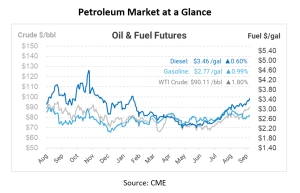
Optimizing Fuel Systems Management for Safety and Efficiency
With operating efficiency growing in importance for businesses, keeping your fuel systems in line with best practices is critical. From environmental risk to fast and efficient fueling, there are a number of reasons to monitor your fuel tank and dispensing equipment regularly.
Establishing a comprehensive inspection program can ensure safe operations while mitigating the high costs that can arise from neglecting fuel systems.
Weekly Fuel System Health and Safety Inspection
Fuel dispensers operate under challenging conditions, exposed to heavy usage, varying environmental factors, and occasionally, improper handling. As a preventive measure, implementing a weekly visual inspection program for nozzles, hoses, filters, and overall dispenser status is imperative. Damaged nozzles and worn hoses may lead to minor leaks, jeopardizing safety and potentially leading to environmental penalties. Addressing these issues promptly through service calls can minimize disruptions to fueling operations.
To maintain optimal flow rates, it’s essential to monitor fuel flow regularly. When pumps go too slowly, your drivers waste precious time filling their tanks. Comparing actual flow rates to manufacturer-rated rates can help identify the need for filter replacement. Should significant variations be detected, installing new filters and documenting the change through service calls is recommended.
Filter changes are typically advised quarterly, although frequency may vary due to specific factors. Persistent slow flow conditions necessitate evaluating fuel quality through thorough multi-point sampling. Such sampling encompasses the bottom and mid-points of the tank, particularly near the suction point. Whether conducted visually or by certified laboratories, these samples can pinpoint potential tank problems like corrosion-induced particulates, microbial growth, or improper fuel additive techniques. Addressing fuel quality issues through proper cleaning and polishing is often the most effective solution. Avoid the temptation of installing more lenient filters, which can exacerbate problems.
Underground and Above Ground Storage Tanks Inspections
For Underground Storage Tank (UST), inspections should verify the correct sealing of openings, proper labeling of fills as per regulatory guidelines, clear operating areas, and overall system functionality. It’s recommended to inspect Containment Areas to identify the presence of water or fuel. Automatic Tank Gauges (ATGs) help manage inventory and monitor the environmental aspects of tanks and piping systems. Any detected ATG alarms should be promptly addressed.
In the case of the Above Ground Storage Tank (AST), inspections should ensure spill kits are properly supplied, the area is debris-free, level monitors function effectively, and the tank’s condition is optimal. Overfill prevention equipment should be evaluated, and any visible leaks or inadequately sealed openings should be addressed to prevent water intrusion.
Advantages of Weekly System Inspections
Implementing a weekly and quarterly inspection program is a baseline for effective fuel management. These proactive procedures ensure seamless operations, uphold environmental responsibilities and cultivate a safe fueling environment. By promptly identifying and addressing potential issues, businesses can save on costly repairs, maintain regulatory compliance, and demonstrate a commitment to sustainable practices.
Expertise to Get it Right
For businesses seeking comprehensive fuel systems solutions, Mansfield Energy offers a complete suite of services. From design and installation to maintenance and compliance, Mansfield’s offerings encompass every aspect of fueling systems. With a commitment to keeping fueling systems clean, environmentally compliant, and efficiently operational, Mansfield Energy provides services that include design-build, inventory management, transaction management, repair and maintenance, and environmental compliance. Contact us Today!

This article is part of Daily Market News & Insights
Tagged:
MARKET CONDITION REPORT - DISCLAIMER
The information contained herein is derived from sources believed to be reliable; however, this information is not guaranteed as to its accuracy or completeness. Furthermore, no responsibility is assumed for use of this material and no express or implied warranties or guarantees are made. This material and any view or comment expressed herein are provided for informational purposes only and should not be construed in any way as an inducement or recommendation to buy or sell products, commodity futures or options contracts.





